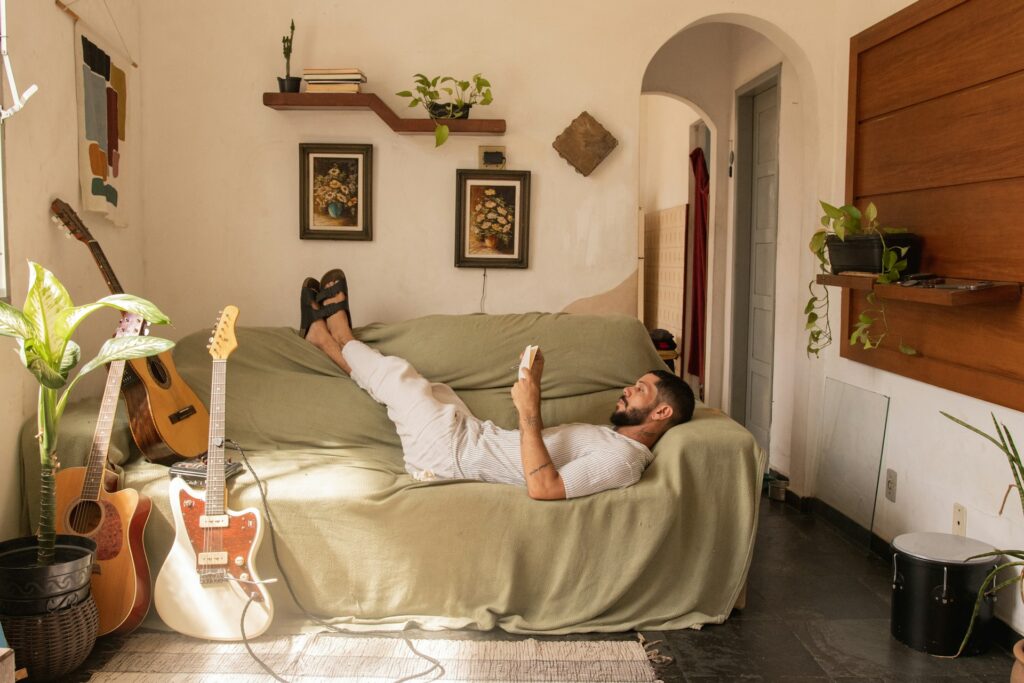There’s a weird kind of guilt that kicks in when you take a day off without notice, like the world’s going to fall apart if you don’t show up for one Tuesday.

However, sometimes, the most healing thing you can do is step back—not for a holiday, not because you’re sick, but just because you’re worn out. An unplanned day off isn’t about being lazy. It’s about listening to what your mind and body are quietly begging for. And more often than not, it gives you exactly the reset you didn’t realise you needed. Here’s why it could end up doing you a world of good.
1. It lets your nervous system slow down.

When you’re constantly switched on—emails, meetings, chores, noise—your nervous system never really gets to power down. Even when you’re “relaxing,” there’s usually something nagging at you. But taking an unplanned day off gives your body a rare chance to move out of survival mode. No to-do list, no agenda, no pretending you’re fine. Just breathing space.
That doesn’t mean you have to spend the whole day doing nothing. It just means you’re not operating on pressure or deadlines. Even a few hours of low-stimulation time—without checking your phone every five minutes—can lower cortisol and help you feel like yourself again.
2. It breaks the autopilot cycle.

It’s easy to fall into routines that keep you going but don’t actually nourish you. Wake up, work, scroll, repeat. When you take an unexpected day off, it disrupts that pattern. Suddenly, you’re not on the treadmill. You’re on a bench beside it, asking yourself if the pace you’ve been keeping even makes sense.
That break in rhythm gives you space to notice what’s working and what isn’t. It’s a chance to realign with yourself—not in a deep, dramatic way, but just enough to feel like you’re living with intention again instead of just going through the motions.
3. It reminds you that rest doesn’t need to be earned.

There’s this toxic idea that you only deserve rest if you’ve been productive enough. But your body doesn’t care how many tasks you crossed off yesterday. If you’re exhausted, you’re exhausted. Taking a spontaneous day off pushes back against that “earn your rest” mindset and lets you honour what your system actually needs.
This change in thinking is huge for mental health. It reminds you that you’re allowed to take breaks without explaining yourself or feeling bad. You’re a human being, not a machine, and humans are allowed to have off days without needing permission slips.
4. It helps you reconnect with your instincts.

When everything in life is scheduled and structured, it’s easy to lose touch with your inner signals. Hunger cues, energy dips, mood changes—they all get drowned out by external demands. However, when you take a day off just because you felt like you needed one, it’s an act of trust. You’re saying, “I hear myself, and I’m listening.”
That kind of reconnection is underrated. It helps rebuild self-trust and reminds you that you don’t always need a crisis to pause. Sometimes, the best form of self-care is just tuning in early and giving yourself what you need before things spiral.
5. It softens burnout before it gets worse.

Burnout doesn’t usually show up all at once. It creeps in slowly—irritability, brain fog, low motivation, constant tiredness—and most people ignore those early signs until it’s too late. Taking an unplanned day off can act like a pressure valve. It lets some of that internal build-up release before things start breaking down.
It’s like your brain saying, “I need a minute,” and you’re actually giving it one. That one day might stop a week of spiralling later on. It’s not about being lazy; it’s about being proactive with your wellbeing instead of waiting until you crash.
6. It creates space for boredom, which your brain actually needs.

We fill every second with stimulation—music, scrolling, multitasking. However, our minds need pockets of boredom to reset and wander. Taking a spontaneous day off creates that space, even if you don’t plan anything exciting. It invites quiet, stillness, and the kind of mental drift that leads to real rest or creative ideas.
You might start the day feeling aimless, but by the afternoon, your brain’s softened. You’ve noticed things you normally rush past. Maybe you start doodling, cooking, sitting outside—stuff that doesn’t demand much, but ends up feeling deeply satisfying.
7. It gives you back a sense of control.

When life feels overwhelming, it’s easy to feel like everything’s happening to you. An unplanned day off is a way of saying, “Actually, I’m allowed to step back. I’m in charge of my time.” That autonomy is incredibly powerful, especially when things feel chaotic or over-scheduled.
You don’t always need to make big changes. Sometimes, just knowing you have the power to pause changes how you move through the rest of the week. It reminds you that you’re not stuck—you’re allowed to choose something softer, even if only for a day.
8. It gives you space to feel what you’ve been avoiding.

Busyness is a great distraction. When your schedule is packed, you don’t have time to sit with sadness, anger, confusion, or loneliness. However, when you take a break, all those feelings have a chance to surface, and while that might feel uncomfortable, it’s also necessary.
You can’t heal what you never acknowledge. Letting yourself feel without having to perform, explain, or rush to fix things can be a huge mental release. Even crying on the sofa in your dressing gown can be a form of deep emotional rest.
9. It reminds you of who you are outside of work or roles.

It’s easy to get tangled up in your job, your responsibilities, or the version of yourself that shows up for everyone else. An unplanned day off strips all that back. There’s no performance, no productivity checklist. Just you, being a person again.
You get to check in with your quieter interests, your natural rhythms, the things that bring you joy without pressure. It’s a reminder that you’re more than your output. You’re someone with needs, preferences, and moods that don’t revolve around being useful.
10. It helps you come back to work with a clearer head.

Ironically, stepping away often makes you better at what you do. When you take a mental reset day, you give your brain time to sort through clutter in the background. Ideas get clearer, problems feel less impossible, and your tolerance for stress tends to improve.
You’re not coming back just because the clock says so—you’re returning with a little more space inside. That breathing room makes everything feel more manageable, which often leads to better focus, more patience, and fewer moments of snapping over nothing.
11. It strengthens your boundary-setting muscles.

It takes guts to say, “I need today off” without having a dramatic excuse or visible illness. However, the more you practise setting that boundary, the more natural it becomes. You realise you don’t always need to justify taking care of your mental health, and the people who respect that are the ones worth keeping around.
Each time you do it, you chip away at the guilt. You build confidence in your right to rest. The more you model that for other people, the more it opens the door for people around you to do the same. Boundaries create ripples—healthy ones.
12. It’s a calm reminder that you’re not a machine.

You weren’t built to operate at full speed all the time. You’re not failing just because you need a break. Taking a spontaneous day off reminds you that rest isn’t a flaw in the system—it’s part of the system. Bodies and minds need downtime. Always have, always will.
So the next time you feel that quiet whisper of burnout building, try listening to it. Take the day. Sleep in. Sit outside. Be still. There’s nothing weak about choosing rest before you’re forced into it. In fact, it might be the strongest move you make all week.


